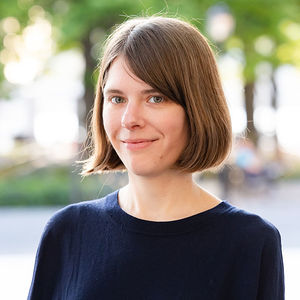
Photo by Liz Ligon.
Watching Bard Graduate Center (BGC) students present at their Qualifying Paper (QP) Symposium is a special moment for Helen Polson, assistant professor of practice in writing at BGC. Reflecting on the 2021 QP symposium, she said, “I feel like it was an incredibly strong year. Right in the midst of COVID, and researching at home all by themselves, how did they do that? It was amazing.” It was particularly poignant for her as these were the first students to take her course, “Writing Objects,” which she began teaching two years ago.
Polson has been a writing tutor at the BGC since 2012. After spending years getting to know the students and their work, she “felt that BGC could support its students more and could get more out of them if we did more,” so she proposed teaching a writing course to Dean Peter N. Miller. They conceived of “Writing Objects” as a complement to the other required courses, “Objects in Context” and “Approaches to the Object,” in the first-year core curriculum. In “Writing Objects,” Polson covers topics essential to graduate writing: everything from how to properly cite sources, paraphrase, and write proposals; to skills that are more specific to writing about material culture, such as how to write object comparisons, object labels, and explore the potential of writing as a cognitive tool. She still finds time to work one-on-one with students on their class assignments, essays, and QPs, so in addition to benefiting from her foundational course, they can also draw on Polson’s unwavering support for the duration of their time at BGC.
An exuberant and approachable professor with an undergraduate degree in mathematics, an MA in visual culture, and a PhD in performance studies, Polson began teaching science students how to write while completing her dissertation at New York University and, in the process, learned a lot about writing herself. This multidisciplinary background makes her uniquely qualified to teach writing at BGC. As she reflected,
One of the characteristics of BGC is its interdisciplinary alliances, and one of the hard things that we ask students to do is to hop between disciplines. They might be in an archaeology class in the morning, a material science class in the afternoon, and then at night, doing reading for a history theory class the next morning. Part of transforming yourself from a consumer of knowledge to a producer of knowledge is learning to be a master of all those disciplines—to be able to move between them and integrate them into one body of knowledge. And I think, because I have this background in mathematics and performance studies, that I’m able to be flexible in my approach to writing in a way that’s unusual for writing teachers who tend to come up through, say, English. It’s part of what I can offer students.Her academic knowledge of performance studies, specifically how objects are used in performance, has also been useful to students, and she particularly enjoys working with students who are writing about “performing objects” and theatrical props, movement and corporeal techniques, queer and disability studies, and performance and film. She also enjoys teaching subjects that are outside of her comfort zone. This past year she taught a workshop on historical fiction, which both she and students found to be very productive. Thinking about the future of “Writing Objects,” Polson says, “One of the directions I’d like to move in is to explore an expanded view of what forms and modes of writing are appropriate to the study of material culture. I’m inspired by the innovative writing and teaching of my colleagues and, of course, the engaging work of my students.”

